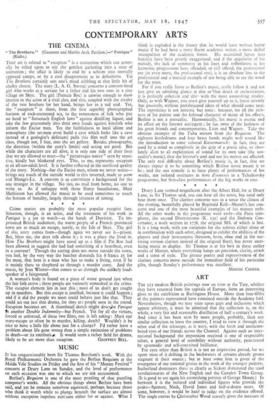MUSIC
IT has unquestionably been Sir T'nomas Beecham's week. With the Royal Philharmonic Orchestra he gave the Berlioz Requiem at the Maida Vale Studios on Friday and the first of his "Mozart Festival" concerts at Drury Lane on Sunday, and the level of performance on each occasion was one to which we are' nbt accustomed.
Berlioz's Requiem is one of the most puzzling of that puzzling composer's works. All the obvious things about Berlioz have been said, and yet he remains somehow equivocal, perhaps because those who think it worth while to plunge beneath the surface are almost without exception hopeless Dart:sans either for or against. What I
think is exploded is the theory that he would have written better music if he had been a more fluent academic writer, a more skilful manipulator of the academic forms. His occasional lapses into banality have been grossly exaggerated, and if the angularity of his melody, the lack of symmetry in his lines and smoothness in his harmonic progressions have offended, or still offend, the professional ear (or even more, the professional eye), it is an absolute loss to the professional and a musical example of not being able to see the wood for the trees.
For if you really listen to Berlioz's music, really follow it and not just give an admiring glance at this or 'that detail of orchestration, it is perfectly coherstnt and alive with the most astonishing vitality. Only, as with Wagner, you must give yourself up to it, listen intently but passively, without prefabricated ideas of what should come next. The experience is not narcotic but tonic: because, for all the rich- ness of his palette and the kolossal character of many of his effects, Berlioz is not a sensualist. Harmonically, his music is ascetic and its effect on the listener astringent ; he has none of the lushness of his great friends and contemporaries, Liszt and Wagner. Take the obvious example of the Tuba mirum from the Requiem. The eighteen kettledrums and four brass bands might well sound like the introduction to some colossal Kaisermarsch: in fact, they are used by a mind so completely in the grip of a poetic idea, so abso- lutely alien to all exploitation of sound for its own sake (the sen- sualist's music), that the listener's soul and not his nerves are affected. The only real difficulty about Berlioz's music is, in fact, that we always expect it to be something which Berlioz never, meant it to be ; and the one remedy is to have plenty of performances of his works, not isolated overtures as hors d'oeuvres to a Tchaikovsky, programme, but first-class performances of the big works in toto.
* * * * Drury Lane seemed magnificent after the Albert Hall, for at Drury Lane, as Sir Thomas said, you can hear all the notes, but need only hear them once. The clarinet concerto was in a sense the climax of the evening, beautifully played by Reginald Kell—Mozart's last con- certo and one of the most beautiful examples of his mature style. All the other works in the programme were early—the Paris sym- phony, the second Divertimento (K. 131) and the Sinfonia Gon- certante, a work written in 1778, the original MS. of which is lost. It is a long work, with ten variations for the soloists either alone or in combination with each other, designed to exhibit the abilities of the players and their instruments (bassoon, horn, oboe and in the sur- viving version clarinet instead of the original flute), but never sacri- ficing music to display. Sir Thomas is at his best in these earlier works of Mozart, where everything hangs on precision, clarity, attack and a sense of style. The greater poetry and expressiveness of the clarinet concerto move outside the immediate field of his particular gifts, though Sunday's performance was excellent.
MARTIN COOPER.


































 Previous page
Previous page